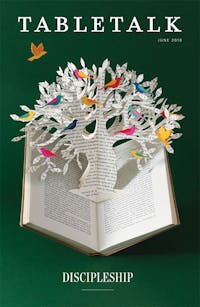
Request your free, three-month trial to Tabletalk magazine. You’ll receive the print issue monthly and gain immediate digital access to decades of archives. This trial is risk-free. No credit card required.
Try Tabletalk NowAlready receive Tabletalk magazine every month?
Verify your email address to gain unlimited access.
In Acts 2:42, Luke provides a summary of the ways believers in the early church grew as disciples. He writes, “And they devoted themselves to the apostles’ teaching and the fellowship, to the breaking of bread and the prayers.” According to Luke, these Christians devoted themselves to four basic means by which they were discipled. Let us consider these means and the way in which the risen Christ still uses them today in the lives of His people.
First, Luke tells us that the early disciples devoted themselves to “the apostles’ teaching.” We should note that Luke chooses to characterize their activity in terms of devotion. In other words, they made the hearing and the study of the truth as it is revealed in Jesus Christ a priority—a regular, nonnegotiable part of their lives. Still today, most ministers will tell you that those who do this are those who, more often than not, lead the most vibrant and fruitful Christian lives. Those who faithfully attend the public teaching of the Word with a genuine hunger for it are disciples who make disciples. When the Word is preached faithfully, boldly, and winsomely in the power of the Spirit, these disciples are equipped to be faithful, bold, and winsome influencers for Christ in every sphere of their lives.
Luke also speaks of the early disciples’ devotion to “the fellowship.” Our triune God is the God of eternal fellowship, and we, as those made in His image, were made for fellowship with Him and with one another. Our lives are deficient without genuine fellowship with others, especially with others who share our love for Christ. As we proactively encourage one another, the body of Christ is built up spiritually and, very often, numerically. When we are known by our love for one another, those who have not yet tasted and seen that the Lord is good often become curious and open to hear more about the Jesus who is at the center of all our fellowship, and, by the grace of God, become genuine partakers of that fellowship as well.
Third, Luke tells us that the early church was devoted to “the breaking of bread.” This likely refers to their observance of the Lord’s Supper, which they observed, along with baptism (see Acts 2:41), according to Christ’s instruction. In sensory ways, the sacraments of baptism and the Lord’s Supper communicate the Father’s adopting love, the Son’s sacrificial grace, and the Spirit’s life-giving fellowship in such a way as to transform and equip disciples.
The sacraments, like the fellowship of the saints, remind us that we are meant to gather corporately in order to grow as individuals. As blessed as we are in our day with so many Christian books and sermons available through the Internet and otherwise, the sacraments keep us coming back to the gathered church, for which there is no substitute. God is pleased to meet with His gathered people in a special way through our observance of the sacraments. Regarding the way Christ meets with us when we partake of the Lord’s Supper by faith, even the erudite scholar John Calvin had to admit, “I experience it rather than understand it.” Supernaturally, incomprehensibly, the triune God communicates with us, nourishes us, cheers us, and equips us to be disciples through the sacraments. There is no substitute for them in the disciple’s life.
Last, but not least, Luke tells us that the early disciples devoted themselves to “the prayers.” Corporate prayer has been referred to as Christ’s last command and the church’s first responsibility (see Acts 1:14). The early church experientially knew and availed themselves of the power of prayer as they prayed for the Spirit’s filling, wisdom, guidance, and boldness. As C.H. Spurgeon put it: “Prayer meetings were the arteries of the early church. Through them life-sustaining power was derived.”

“The prayers” in Acts 2:42 are likely representative of the overall worship of the early church. Still today, as the church seeks the face of the Father through the mediation of the incarnate Son with the help of the Spirit, the triune God is pleased to inhabit the praises of His people to the glory of His name, the routing of His enemies, and the edification of His church (see 2 Chron. 20:22; Ps. 8:2; Col. 3:16).
These means of grace may appear weak in the eyes of the world, but in the eyes of the Lord and the discerning believer, they are channels through which sinners are brought into relationship with the risen Christ and disciples are empowered to live grateful lives of winsome witness for their Savior. Rather than trusting in the latest innovation, let us follow in the footsteps of the early church and avail ourselves of these ordinary means of grace. As we do, Christ will equip His disciples to make disciples, and His praise will continue to spread to the ends of the earth.
